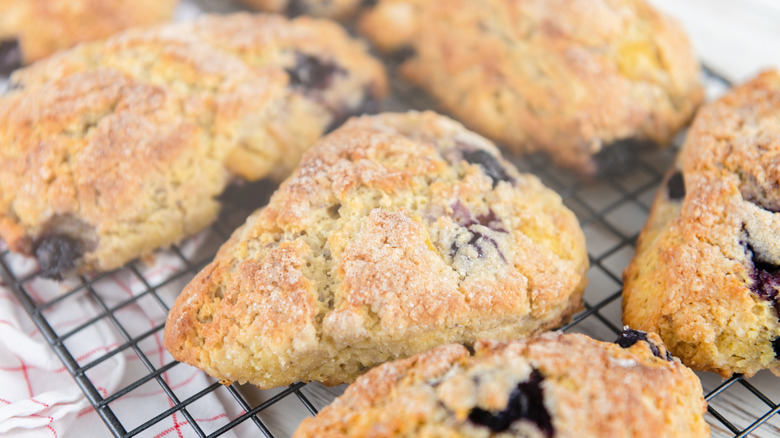The Scone Ingredient Mary Berry And Paul Hollywood Can't Agree On
Tune into an episode or two of "The Great British Baking Show" and you're guaranteed to see at least one scone, whether it's one that's being meticulously prepared by a cheftestant or one that's being savored by one of the judges. Scones, after all, are a staple in the U.K. — light and fluffy, they're the perfect pairing for a cup of tea. Coming in both sweet and savory varieties, from blueberry and chocolate chip to rosemary and cheddar, scones are a cross between a buttermilk biscuit and a pastry.
While the British treats may be delicious, they're notoriously difficult to make from scratch. Or rather, they require very precise measuring and very precise technique. They also require very precise ingredients, according to judges Mary Berry and Paul Hollywood. However, there's one specific ingredient that has the two famous Brits at a stand-off. Here's what Berry and Hollywood disagree on when it comes to baking scones.
You have to use the right type of flour
In the land of scone-making, not all flour is created equal. Berry's classic scone recipe calls for self-rising flour, which is a type of flour that has baking powder and salt added to it. But Hollywood disagrees with her choice, arguing that strong flour is better. "I am forever fighting with Mary about scones," he confessed in an interview with the Great British Food Awards. "She comes from the tradition of using plain flour in scones but in the professional industry you use strong flour. When you make scones with strong flour you'll see the difference!"
Strong flour isn't as common in America as it is in the U.K., but you can still find it on some grocery shelves. Spoon University explains that, as the name suggests, it's the strongest type of flour with a very high gluten content of 14 to 15 percent.

